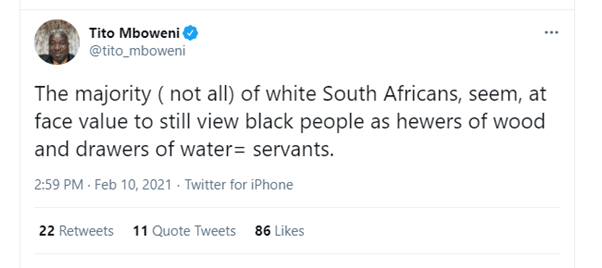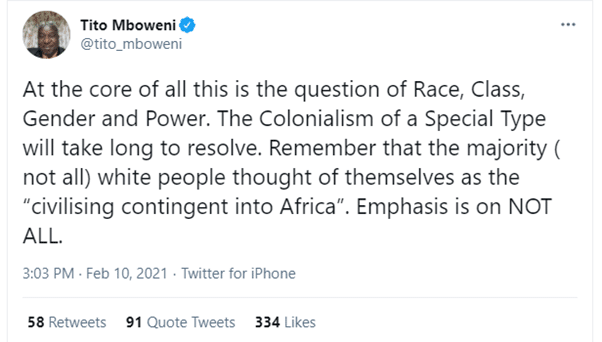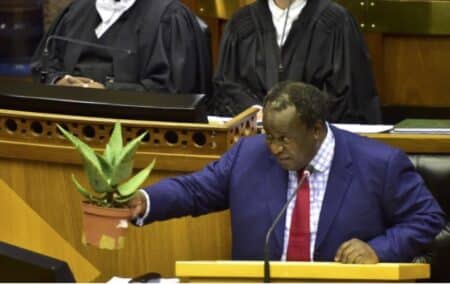On Wednesday a number of strange missives were dispatched by the minister of finance, Tito Mboweni, from (presumably) the wilderness of Magoebaskloof where he has a home.
Mboweni sent a number of tweets on Wednesday afternoon, asking some questions around non-racialism, white South Africans, and, by extension, the place of whites in this country.
The fact that Mboweni asked South Africans on Twitter their opinion on a fairly controversial issue is in and of itself not surprising – the minister is a fairly prolific tweeter, often sharing his culinary concoctions, letting Twitter know what he’s been reading of late, showing off magnificent views from his home in Magoebaskloof, and sometimes asking for policy advice.
The tweets sent on Wednesday afternoon, however, delved into South Africa’s fraught race politics. They are mainly fraught because of Mboweni’s colleagues, in the African National Congress (ANC) and former colleagues in the Economic Freedom Fighters (EFF) but on Wednesday he helped contribute to this state of affairs.



There is little evidence to back up Mboweni’s assertions. Indeed, explicit white racism is now so rare that when it does happen the whole country knows the perpetrators’ names – any South African who vaguely follows current affairs will not have a problem recognising the names Penny Sparrow, Vicky Momberg or Adam Catzavelos. And South Africans generally get on. This is clear from survey and anecdotal data.
And if one does feel that South Africans of other races are unpleasant to you and this is evidence of fraying race relations, you should perhaps tell yourself the parable of the arsehole. If a person goes out one day and interacts with numerous people and one of those people is an arsehole then that person met one arsehole. If a person goes out one day and everyone is an arsehole then that person was the arsehole.
But back to Mboweni – the most pressing issues in South Africa are not recalcitrant whites who consider their black countrymen as little better than servants (if they even exist in any numbers anymore) and the finance minister knows this.
It is not the fault of white South Africans that government spending has reached unprecedented levels and has brought the country to the brink of a debt crisis. It is also not the fault of white South Africans that since 2009 the government has insisted on moving away from policies which saw economic growth, and contrary to much received wisdom, resulted in an increase in jobs.
The fault for growth-destroying policies can only be laid at the door of the ANC. In the past decade the government has embarked on a number of policies which have made the odds of many South Africans securing a life lived in comfort and dignity much lower. It is also the fault of the ANC, rather than whites, that education for many black children remains abysmal, nearly a generation after the end of apartheid.
It is undoubtable that South Africa is a better place than it was in 1994. Is it a better place than it was in 2009? That is a harder question to answer and the answer is probably no. And this is only because of the policies the governing party has chosen to follow since then.
But the government seems hellbent on continuing on a path of continued decline. The insistence on implementing expropriation without compensation, for example, will doom South Africa to economic regression for a generation.
And new polling from the Institute of Race Relations shows that most South Africans believe issues like land reform and racism are not as pressing as the government would like to have us believe. So perhaps Mboweni’s energy could be better spent addressing what South Africans really consider problems, rather than conjuring up a non-existent wit gevaar.
Just over half of South Africans identified our unemployment crisis as the most serious issue facing the country today, followed by 22% who said crime, and 18% who believed corruption was the most serious.
Land reform was identified by only four percent as the country’s biggest issue (and only 4.8% of black South Africans). Only three percent of all respondents (and a similar number of black respondents) identified racism as the country’s major problem.
In addition, only a quarter of respondents felt that race relations have become worse since 1994. It is somewhat concerning that a quarter of South Africans believe that race relations have deteriorated but conversely, this indicates a much larger proportion believes they’ve improved.
In the final analysis, Tito Mboweni’s disgraceful use of the race card on Twitter will do very little to fix the problems ordinary South Africans face. It’s time for hard decisions which it has now become increasingly clear that neither Mboweni nor his boss President Cyril Ramaphosa, are willing to take.
And it is not blacks nor whites who are solely responsible for this country’s successes or failures, but South Africans. South Africa will only succeed if we work together to create a prosperous country with dignity for all. And it’s becoming increasingly clear that the ANC is a stumbling block in reaching this goal.
(Picture: Twitter/@ParliamentofRSA)

